Cruise Control operation
Setting speed
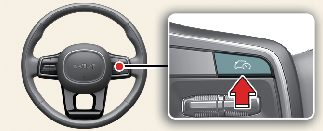
-
Accelerate to the desired speed, which must be more than 30 km/h (20 mph).
-
Press the Driving Assist button at the desired speed. The set speed and Cruise (
 ) indicator will appear on the cluster.
) indicator will appear on the cluster.
-
Release the accelerator pedal.
Vehicle speed will maintain the set speed even when the accelerator pedal is not depressed.

-
The vehicle may slightly slow down or speed up whilst driving uphill or downhill.
-
The Driving Assist button symbol may vary depending on your vehicle option.
Increasing set speed
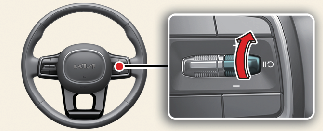
-
Push the (+) switch up and release it immediately. The set speed will increase by 1 km/h (1 mph) increments.If the cluster speed unit is mph, it will increase in multiples of 5.
-
To increase the set speed quickly, push and hold the (+) switch. The set speed will increase in increments of 10.
You can set a maximum speed of 200 km/h (120 mph). (However, if your vehicle has a maximum speed-limiting device mounted, you can only set it to 110 km/h.)
Decreasing set speed
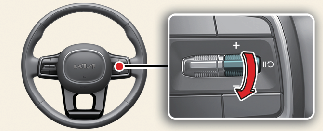
-
Push the (-) switch down and release it immediately. The set speed will decrease by 1 km/h increments.To decrease the set speed quickly, push and hold th (-) switch. The set speed will decrease in increments of 10.If the cluster speed unit is mph, it will decrease in multiples of 5.
-
You can set a minimum speed of 30 km/h (20 mph).
Accelerating temporarily
If you want to speed up temporarily when Cruise Control is on, depress the accelerator pedal.
To return to the set speed, take your foot off the accelerator pedal.
If you push the (+) switch up or (-) switch down at increased speed, the set speed will be set to the current increased speed.
Temporarily pausing Cruise Control
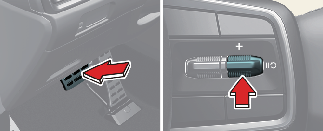
Cruise Control will be paused when:
-
Depressing the brake pedal.
-
Pressing the (
 ) switch.
) switch.
-
Shifting the gear to N (Neutral).
-
Decreasing vehicle speed to less than approximately 30 km/h (20 mph).
-
ESC (Electronic Stability Control) is operating.
The set speed will turn off but the Cruise ( ) indicator will stay on.
) indicator will stay on.

If Cruise Control pauses during a situation that is not mentioned, Kia recommends that you visit an authorised Kia dealer/service partner.
Resuming Cruise Control
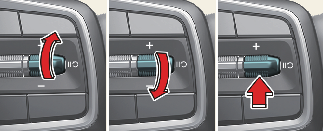
Operate the (+), (-) or ( ) switch.
) switch.
If you push the (+) switch up or (-) switch down, the set speed will be set to the current speed on the cluster.
If you press the ( ) switch, vehicle speed will resume to the preset speed.
) switch, vehicle speed will resume to the preset speed.
The vehicle speed must be above 30 km/h (20 mph) for Cruise Control to resume.

Check the driving condition before using the ( ) switch. Driving speed may sharply increase or decrease when you press the (
) switch. Driving speed may sharply increase or decrease when you press the ( ) switch.
) switch.
Turning off Cruise Control

Press the Driving Assist button to turn Cruise Control off. The Cruise ( ) indicator will go off.
) indicator will go off.
Always press the Driving Assist button to turn Cruise Control off when not in use.

If your vehicle is equipped with Manual Speed Limit Assist, press and hold the Driving Assist button to turn off Cruise Control. However, Manual Speed Limit Assist will turn on.

Take the following precautions when using Cruise Control:
-
Always set the vehicle speed under the speed limit in your country.
-
Keep Cruise Control off when the function is not in use, to avoid inadvertently setting a speed. Check that the Cruise (
 ) indicator is off.
) indicator is off.
-
Cruise Control does not substitute for proper and safe driving. It is the responsibility of the driver to always drive safely and should always be aware of unexpected and sudden situations from occurring.
-
Always drive cautiously to prevent unexpected and sudden situations from occurring. Pay attention to the road conditions at all times.
-
Do not use Cruise Control when it may be unsafe to keep the vehicle at a constant speed:
-
When driving in heavy traffic, or when traffic conditions make it difficult to drive at a constant speed
-
When driving on rainy, icy, or snow-covered roads
-
When driving on hilly or windy roads
-
When driving in windy areas
-
When driving with limited view (possibly due to bad weather, such as fog, snow, rain and sandstorm)
-